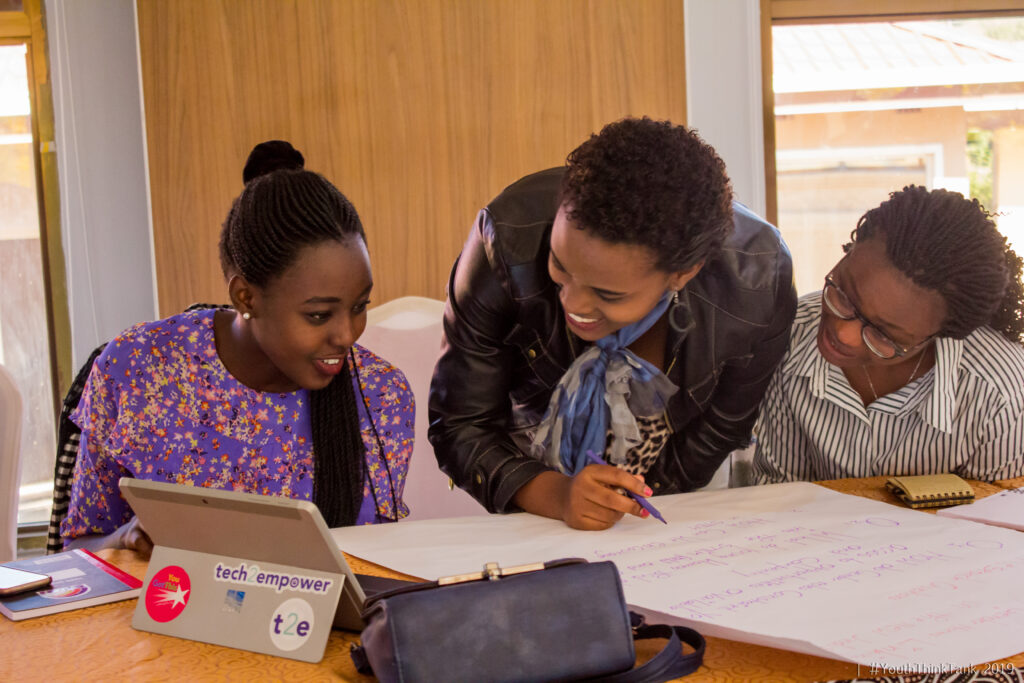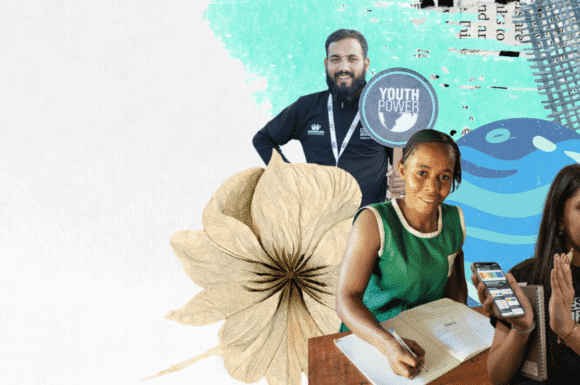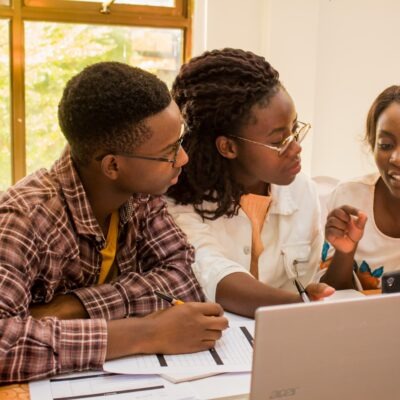Young people using insights to drive change
Through our youth-led research approach, we partner with young people to capture key insights on the issues that matter most to them. We strive to make research accessible to diverse young people and actionable for decision-makers.
For us, youth-led research is not just about ensuring meaningful youth engagement in everything we do. It is not just about ensuring youth insights are captured by those best positioned to do so – their peers. It is also fundamentally about shifting power, posing: Who is an ‘expert’? Who owns knowledge? Who gets to generate knowledge?

We listen to young people
Through our growing investment in research, we value listening to lived experience and needs of the young people we support. Through our youth-led research approach, we listen to the expertise and insight of their peers, whom we engage as partner researchers. Our approach seeks to maximise their leadership at every stage of the research process.
Supporting young people to conduct research is about more than just the leadership journey it affords them. Meaningfully engaging young people in research enhances the relevance and accuracy of the insights we generate. We believe that youth leadership in research means we:
Ask better questions.
Because we ensure that we ask the right questions – those that are relevant to young people’s priorities.
Capture better data.
Because young researchers can develop a deeper rapport with their peers, gaining richer access to their lived experience.
Generate better insights.
Because young people can identify findings where we have ‘blind spots’ and miss nuance in our data.
Living in the Climate Crisis
Climate change is affecting young people in Uganda. How are they addressing the crises? Read our latest report.
Read the reportThe youth-led research approach offers a powerful and transformative methodology that prioritises young people’s active involvement and ensures that the research process is deeply relevant, inclusive, and impactful. The rationale for the youth-led research approach is grounded in the desire to foster agency, ensure relevance, and shift power dynamics in the research process. It emphasises the value of young people’s perspectives, prioritises inclusivity, and ensures that the research is rigorous and responsive to the needs of the communities it serves. This approach transforms young researchers from passive subjects to active leaders, advocates, and changemakers in the research and the real-world application of their findings.
Our 6-step methodology
Our 6-step youth-led research methodology prioritises young people’s leadership in producing, translating, and disseminating knowledge, enabling them to shape the entire research process from beginning to end. At its core, this approach shifts power to young people, allowing them to participate and lead the research efforts. Young researchers are at the heart of this process, with their roles shifting from participants to active leaders throughout the research journey. What sets this methodology apart is the clear delineation of roles for young researchers and staff at every stage, ensuring that young people take on leadership responsibilities while being supported by the staff’s technical expertise to maximise their impact.
Figure 1: 6-step methodology
Step 1: Setting the Framework
Before setting the framework, young researchers are intentionally recruited based on their alignment with the study’s focus, the respondents’ ages, and their geographical locations, ensuring that those involved have a direct stake in the subject matter. To ensure rigour and relevance, after recruitment, the young people undergo a training program on conducting literature reviews, where they are equipped with the necessary information and skills to perform the literature review before the foundational training. Information gathered through the literature review contributes to setting up the research framework and confirming the methodological approach.
The literature review focuses on understanding the existing body of work surrounding the subject matter, refining the research problem using the “5 Why” process to arrive at multiple layers and the root problem. Accurate identification of the knowledge gap is a pre-requisite to defining the methodology and segueing into the designing study tools. The process ensures the findings are directly relevant and impactful for programming and advocacy efforts. Through this process, we guarantee that the research remains grounded in high-quality information while empowering young people to apply their knowledge and insights throughout the research journey. This methodology ensures that the study is rigorous, meaningful, and reflective of the perspectives and expertise of young people themselves.
After the literature review process, the young researchers undergo a comprehensive one-week training program led by the technical research team. This training enables them to define the research framework, identify adequate methodologies, and learn more about ethical considerations and safeguarding practices.
Step 2: Designing the Questions
In Step 2, the technical team supports young researchers in co-designing research tools, such as focus group discussion guides, questionnaires, and semi-structured interview formats, in line with the selected methodologies. This collaborative approach shifts the power dynamics, ensuring that young people are not just recipients of research findings but active contributors to shaping the entire research process. By giving them ownership over the design and execution of the research, we are fostering a sense of agency and ensuring that their perspectives and expertise drive the research process.
Step 3: Collecting the Data
Young researchers work collaboratively in teams to collect data using the methods established in Step 2. To reduce inter-observer bias, the researchers are trained on the researcher’s positionality during the foundational training. Equipping young people with the necessary skills to collect data shifts the power to young people and values their lived experiences as essential expertise in the research process. Recognising the diversity of the respondents, we ensure that the research uses an intersectional approach and captures a wide range of perspectives, as each group brings unique insights shaped by their contexts. By drawing on the lived experiences of young researchers, we enrich the data collection process and ensure that the research reflects the authentic voices and realities of the communities involved. This guarantees that young people take ownership of both the process and the outcomes, ensuring the research truly reflects the diverse experiences within the study.
Step 4: Analysing the Data
Following data collection and transcription, young researchers participate in a one-week workshop to collaboratively analyse the findings using different analysis approaches based on the methodology used (quantitative, qualitative or mixed methods). This research phase is a key moment for shifting power, as it places young people at the centre of the analysis process, drawing on their lived experience and insights to interpret the data. Their unique perspectives are crucial in identifying and addressing gaps or overlooked aspects in the initial data collection, ensuring the analysis is comprehensive and inclusive of all voices. The analysis plan highlights the diverse experiences of different groups within the research population, allowing young researchers to document and reflect on the nuanced realities that may not have been fully captured in earlier stages. By supporting young people in leading this critical phase, we ensure that the research process is grounded in real-world experiences and attentive to the complexities of the data.
Step 5: Conducting Validation Exercises
Young researchers play an integral role in the validation process by engaging with community members to ensure the accuracy and relevance of the findings. Building on the gap analysis conducted in the previous stage, they will actively incorporate any newly identified information, ensuring that the data reflects the full spectrum of community experiences. This collaborative validation exercise enables young people to check the integrity of the research, integrating insights from those directly impacted by the study. Additionally, young researchers will be involved in the report-writing process, weaving their perspectives into the narrative to ensure the findings are valid, meaningful, and reflective of the communities’ voices. Through this process, young researchers take ownership of both the validation and dissemination phases, further shifting the power and ensuring the research is authentic and responsive to the participants’ lived experiences.
Step 6: Convening Conversations for Action
Young researchers lead advocacy and accountability convenings, presenting their findings and engaging in discussions with diverse audiences, including government representatives, civil society organisations, and community stakeholders. This critical phase positions young people as key voices in influencing decision-making and driving social change. Young researchers actively facilitate conversations, challenging stakeholders to reflect on the findings and consider how they can contribute to meaningful action. This approach ensures that young people are not just research subjects but powerful advocates for their communities, holding duty-bearers accountable and amplifying the voices of those often marginalised.
In addition to convening discussions, young researchers also engage in a comprehensive report dissemination strategy, ensuring their findings reach a wider audience through various platforms. This includes sharing research outcomes through blogs, digital communications, social media, and other online platforms, making the findings accessible and impactful to local and global communities. These efforts help create a broader conversation around the issues and ensure that the research contributes to long-lasting change. By leveraging these digital tools, young researchers ensure that their work doesn’t just remain within the walls of meetings but is actively shaping public discourse. Through these combined efforts, young researchers demonstrate their leadership, ensure the research leads to tangible outcomes, and amplify the insights and needs of the communities they represent.
What are they working on?
We don’t conduct just any research. We are guided by the priorities of young people and by the unanswered questions that arise from the previous work we’ve done. In doing so, we are curating a growing evidence base, constantly driven by digging deeper into the issues we are investigating and generating more detailed insights.
With a rich portfolio, we can’t capture all of our insights here. However, these are the questions that our researchers are asking now:

Education and Livelihoods
Young people should have a say in the education and job opportunities that shape their lives.
How can young people lead the conversation to ensure they can access education and livelihood opportunities that are appropriate for the world we live in?

Strengthening Youth Civil Society:
What support do youth-led civil society organisations need to achieve their strategic ambitions?
What is the long-term impact of the crisis on youth civil society’s resilience?

Capturing the Local Impact of Climate Change:
How is climate change affecting young people, their health and livelihoods, and how are they responding?
What aspects of their experience are missing from the global conversation?

Supporting Young People’s Resilience to COVID-19:
How are diverse groups of young people being uniquely affected by COVID-19 and its ongoing, realtime impacts?
How are individual young people, and youth civil society coping, adapting, and responding to these impacts?
Watch this space and see what they learn!
EXPLORE REPORTS BY CATEGORY
Through our youth-led research, we are establishing a generation of thought leaders
At Restless Development, we do not conduct research for intellectual curiosity. We judge the success of our research on how well our findings are used. We use the evidence we generate in 3 ways: to inform the programmes we design; to influence development policy and practice; and to broaden perspectives on the role young people can play in local, national, regional, and international decision-making spaces.
“Our research on young people’s adoption of agricultural technology identified those in rural communities lack information on available technologies because it is shared on the wrong channels. We are working with an agribusiness incubator in Uganda on a plan to change that.” Winnie 24, Uganda
We support our young researchers to use the transferable skills they learn through research through their careers. We use their findings to influence our programmes and others work. We convene our network of alumni researchers to share news and opportunities.
Our research projects & reports
These are just some of the projects our young researchers are working on around the world.
Let’s talk
Want to find out more? Interested to know how you can work with talented young researchers? We’d love to hear from you. Contact us at research@restlessdevelopment.org










